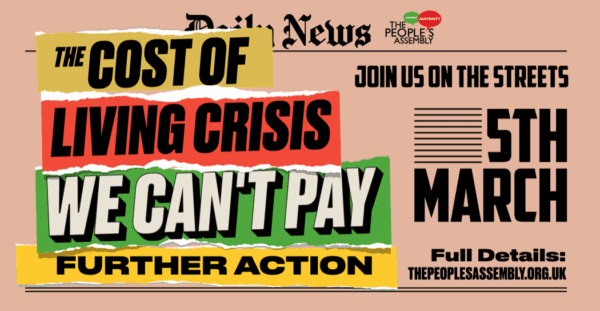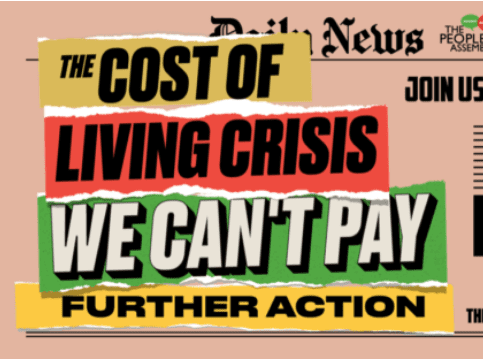On Saturday March 5th crowds will gather at Downing Street to protest against what they see as a “cost of living crisis.” On the same day similar protests will take place in 25 other cities around the UK.
This follows on quickly after a similar day of action on February 12th. Both days were coordinated by The People’s Assembly (PA), which was launched in February 2013 via a letter to the Guardian signed by well-known names ranging from Jeremy Corbyn to the author Iain Banks
On the 12th protestors gathered everywhere from Parliament Square in Central London to Newcastle city centre and Glasgow’s George Square to hold up placards and banners reading #Energy For All, Tax the Rich, and People Before Profit – to select just a few.

Labour MP and current Secretary of the People’s Assembly Laura Pidcock had this to say while attending demonstrations in Manchester: “While there are companies making massive profits and the richest individuals are getting so much richer, everybody else is having to suffer, making very difficult decisions to try and get by… Meanwhile the government sits by and does nothing to help the people.”
On the Thursday before the demonstrations independent MP Jeremy Corbyn tweeted a message of support for the protesters.
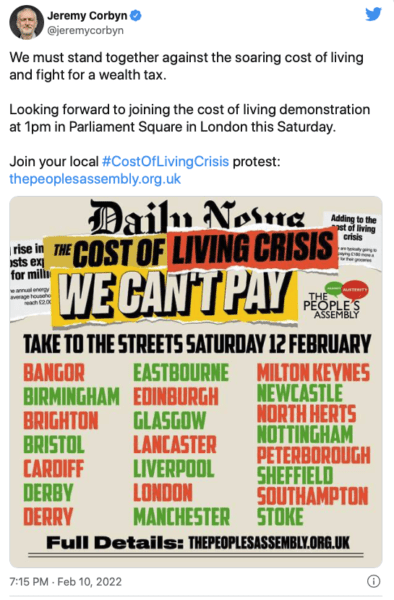
The “cost of living crisis” is described on the PA website as a scenario in which price rises in everything from food to energy mean that many “face impoverishment and uncertainty in their wages, jobs, conditions and welfare provisions…”
Due to an ongoing global increase in the demand for oil and gas, wholesale prices have increased, which means energy providers now pay more and are passing this increase on to the customer.
A number of energy suppliers who could previously offer a range of competitive energy deals to rival the ‘Big Six’ (E.ON Energy; British Gas; SSE; EDF Energy and Scottish Power) have recently collapsed, resulting in the majority of UK homes paying gas and electricity tariffs capped by the regulator, Ofgem.
Ofgem’s price cap was introduced in 2019 by the government to protect bill payers by stopping companies from passing increased costs directly on to their customers. The cap is reviewed every six months. Currently the price cap is set at a record £1,277 and is set to rise up by a whopping 54% on April the 1st.
This will result in an energy price cap increase for approximately 22 million customers. Those on default tariffs paying by direct debit will see an increase of £693 from £1,277 to £1,971 per year. Prepayment customers will see an increase of £708 from £1,309 to £2,017.
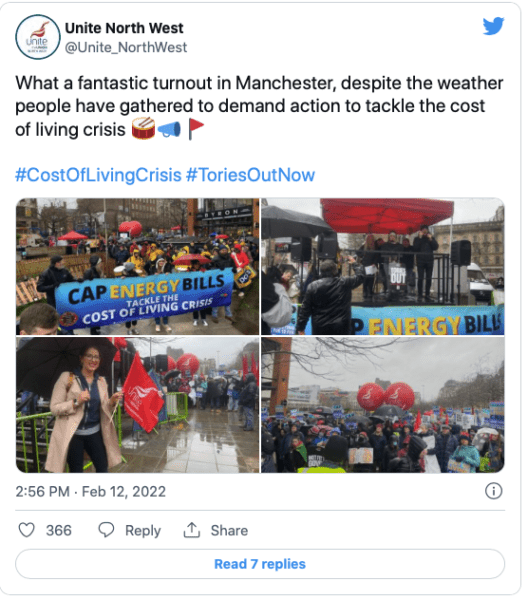 Protestors also voiced their concerns about the rapidly increasing cost of food, which is leaving many with the choice of ‘heating or eating’. Speaking to Sky News, Chris Neville, Chair of Manchester People’s Assembly, said: “People have suffered…this affects people of all ages and backgrounds”.
Protestors also voiced their concerns about the rapidly increasing cost of food, which is leaving many with the choice of ‘heating or eating’. Speaking to Sky News, Chris Neville, Chair of Manchester People’s Assembly, said: “People have suffered…this affects people of all ages and backgrounds”.
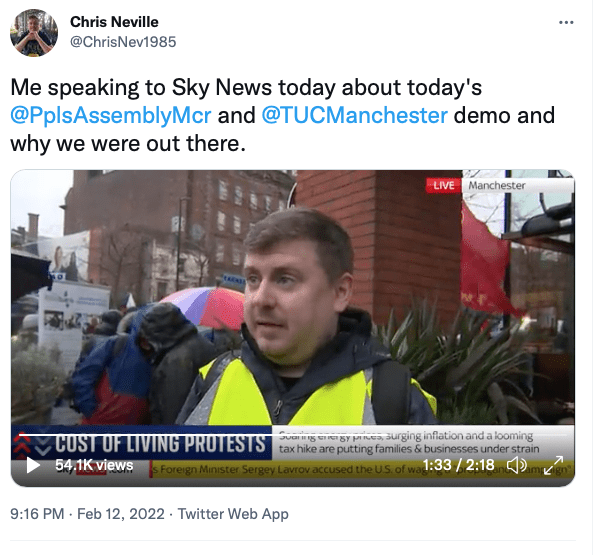
Hikes in the cost of food, furniture, clothes and household goods, etc. meant that in December inflation in the UK rose to a near-30-year high of 5.4%. Inflation is measured by a body called the Office for National Statistics (ONS) which notes the prices of hundreds of everyday items. Inflation is the rate at which prices rise. For example, if a loaf of bread is £1 and it rises by 5p to £1.05, then bread inflation is 5%.
Below is a graph from the BBC comparing figures for regular pay against figures for Consumer Price Inflation (CPI) sourced from The Office of National Statistics.
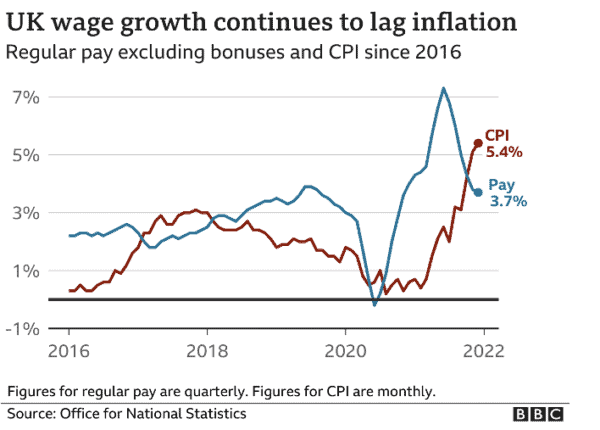
Not long before the February protest Rishi Sunak announced a £9bn package designed to “take the sting” out of the up-and-coming £700-a-year rise in the average household’s energy bills. As reported in The Guardian, he declared that:
- All households would receive £200 off their energy bills in October – but then pay the discount back by £40 a year over five years from 2023
- Council taxpayers in England in bands A to D would receive a rebate of £150 from their bills in April, which will not have to be paid back
- Local authorities would receive £150m to make discretionary payments to the neediest.
- The number of poorer households eligible for the warm homes discount – worth £150 from October – would be increased by a third to 3m.
But the same article quoted Adam Scorer, the chief executive of National Energy Action, a fuel poverty charity, who described the package of measures as so inadequate that it would force “the number of UK households living in fuel poverty to the highest level on record…”
Along with rising energy and food bills – and unaffordable rent – petrol and diesel fuel are also trading at record prices. According to the AA, by Sunday 13th February petrol had jumped to 148.02p per litre. The previous record high was last November when the price was 147.7p. And as for diesel, by Thursday 10th of February the average cost for a litre had reached a record 151.21p.
As we endure a rise in the price of goods that is disproportionate to any rise in wages, the harsh reality is that we will all be affected in some form. But those on the lowest incomes will be hurt most and so for them choice of “heating or eating” is not just a slogan, it is true.
There are most certainly better ways of counterbalancing the continuous rise in bills than loaning households £200 to “take the sting” out of the crisis – especially as that money has to be repaid next year. As many have already suggested, the introduction of a windfall tax would be both fair and feasible.
This would be a tax on the excess profits of the privatised utilities. Shell recently reported a quadrupling of profits, while British-based BP reported annual profits of £9.5bn. Three billion of this was generated during the last three months of 2021 while custumers were struggling with Covid. So while BP piled up profits, their customers were often forced indoors to spend more on energy, while outdoors their groceries also cost more.
There should be little hesitation from the government to impose a windfall tax on companies such as BP, for as their CEO Bernard Looney quipped last November, his company is like a “cash machine”.
